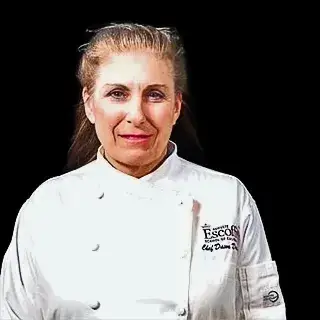BAKING & PASTRY ARTS DEGREE & DIPLOMA
Earn a baking & pastry degree or diploma at one of America’s Top Online Schools in 2026.*
*America’s Top Online Schools 2026, Newsweek
Explore More Programs
Find the program that’s right for you.
Online Programs
Austin Campus
Next start date: Apr 8
Earn a Baking & Pastry Arts Degree or Diploma and Stand Out in the Industry
At Escoffier, we offer convenient online Diploma in Professional Pastry Arts or Associate of Occupational Studies Degree in Baking & Pastry programs in the tradition of french pastry school, all designed to prepare you for a variety of opportunities in the field, such as:
- Bakery manager
- Food stylist
- Chocolatier
- Home baking business owner
- Cake decorator
- Confectioner
- Pastry specialist
- Dessert caterer
Learn more about our online baking and pastry classes, our professional Pastry Chef Instructors, and careers graduates can pursue.
Thinking about starting a baking or pastry career? Download our step-by-step Baking & Pastry Career Plan & Checklist.
REQUEST MORE INFO
60 weeks
Escoffier’s online baking & pastry programs are designed to work with your schedule. In a little more than a year, you could earn a diploma or degree that can set you apart.
54%
The percentage of Escoffier Boulder students (including online programs) who received an income-based federal Pell grant and/or a grant or scholarship from another source, per National Center for Education Statistics.
$7,663
For all students, the average amount of aid awarded in the form of federal student loans in 2022-23 was $7,663, according to the National Center for Education Statistics.
Baking Classes, Pastry Classes, Plus Practical Business and Career Skills
Escoffier’s curriculum is designed to help you pursue career opportunities in baking & pastry.
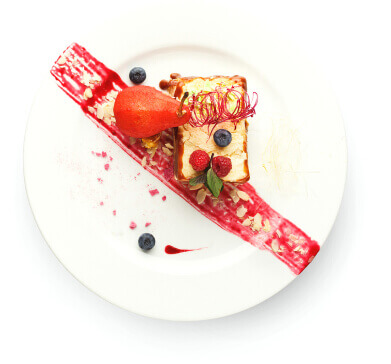
The online baking & pastry degree and diploma programs are composed of industry-relevant courses, including cake decorating classes, chocolate making classes, bread making classes, and more. Courses are completed in a block format under the direction of pastry chef instructors with expertise in teaching the pastry business.
Our baking & pastry programs, designed by industry specialists, offer the flexibility to study from the convenience of your own home, and prioritize work-life-education balance.
All baking and pastry classes include live instruction, high-quality video tutorials, and interactive assignments. If you cannot attend a live class session, recordings are also available. Everything is designed with learning in mind for busy, working adults.
- Attend or review recordings of weekly virtual classes
- Receive personalized feedback from professional Pastry Chef Instructors
- Earn your online pastry degree or diploma from almost anywhere in the world
- Get baking & pastry job search, interview, and career preparation assistance
- Access to alumni mentorship and employer partner network
In this course, students will learn the basics of professional bakeshop work: mise en place, baking math (measuring and converting recipes), and safety and sanitation. Students will then practice the fundamental techniques of pastry and baking, learning multiple methods for creating cookies and doughs.
In this course, students build on what they’ve learned in the previous course. They expand their understanding of the bakeshop, baking a variety of pies and tartlets as well as preparing custards (stove-top and baked), dessert sauces, and pâte à choux.
This course explores different types of menus and their applications. The course covers all aspects of menu planning and design, ranging from visual design to price analysis to making use of available resources. The menu is both a financial tool and a communication tool, and its use as both is explained. Students learn about both food and beverage menus.
This course highlights modern considerations in the baking industry. Trends in diets and eating habits are constantly changing, and being able to stay on top of them is a key industry skill. Students learn about cutting-edge trends in dessert composition and contemporary plating techniques, and how to stay current with those.
This course explores the geographical and cultural influences on desserts from around the world. Students will learn about the desserts of multiple regions of the world, identifying common ingredients and their key flavors, then practicing the production techniques found in the countries of each region. Each week, students will navigate the assigned regions through readings, discussions, and practical assignments.
Three out of five foodservice operations fail within five years of opening, often due to money mismanagement; this course gives students the skills to not only keep their restaurant in business but also turn a profit.
This course introduces students to purchasing, receiving, inventory management and menu pricing. Students learn how to minimize costs and maintain a full range of customer services.
The course progresses from the fundamentals of culinary math into an overview of storeroom operations, inventory, portion control, as purchased and edible portions, ingredient conversions, and recipe costing.
In this course, students learn the basics of baking breads and dough products. Students will use starters and levains, calculate optimal temperature, and work with various doughs and pre-ferments to create multiple different varieties of bread. Students will also continue to develop their ability to follow a production timeline.
This course expands the student’s knowledge of bread into enriched breads. Students will use more advanced methods to create yeasted doughs, laminated doughs, sweet doughs, and puff pastry, and use dough shaping in more complex ways.
This course covers the different types of commercial food service operations, and how to manage each using the principles of good service. Students study the hierarchy of management in food service, and the skills needed to succeed as a manager: training employees, motivating them, disciplining them, and creating a safe and positive work environment. The course also explores how to act responsibly and make decisions that benefit the company.
In this course, students will learn about products that, while not necessarily pastry items or baked goods, are important dessert staples and essential knowledge for the bakeshop. Students begin with the proper techniques in storing, melting, and tempering chocolate, as well as creating chocolate decorations. Students will then move on to sugar cookery and confections, explore a variety of fruit desserts and petit fours, and end the course with lessons on frozen desserts, including ice cream and gelato.
In the Patisserie course, students will delve into more complex pastries. Cakes are the main focus of this course, and students will learn about the classic mixing methods used to create a wide variety of American and European cakes and tortes. Students will also learn about various styles of cake decoration, progressing from basic icings, frostings, and cake assembly to intermediate decorating techniques and fine line piping. Throughout the course, students will develop their ability to bake on schedule, following a production timeline like those in a professional bakeshop.
This course covers such topics as business planning, pricing, credit management, government regulation, legal concerns, and business ethics. Students learn how to manage and how to lead. For the final project for this course, the student will complete and present a business plan for a food service operation.
This course provides opportunities for real life experiences in an operational restaurant or related business and builds on the skills and techniques covered in previous courses. In the course, students apply the skills they’ve learned in practical ways to real-world situations. Students gain hands-on experience in the kitchen that mirrors their future work in the industry and develop the skills necessary for a culinary career. Immersion in a work environment also allows students to develop industry contacts and build working relationships.
The Fundamentals of Baking and Pastry begins with course work concentrating on food safety and sanitation in the professional kitchen. The importance of proper hygiene, food handling and storage, cleaning, pest control and HACCP in a food service operation is explored.
The course includes baking and pastry mixing methods and ingredient identification. The framework to understand the principles of the following cooking and baking techniques are taught: classic pastry doughs, pâte à choux, fried doughs, pies and tarts, baked custards and stove top custards, quick breads, scones, muffins, cookies, brownies and bars, as well as dessert sauces.
This course explores different types of menus and their applications. The course covers all aspects of menu planning and design, ranging from visual design to price analysis to making use of available resources. The menu is both a financial tool and a communication tool, and its use as both is explained. Students learn about both food and
beverage menus.
The Business & Professional Communications course emphasizes the principles and practical application of effective professional communication behaviors within professional, business, and organizational contexts. In addition to identifying the importance of effective communication skills to the hospitality industry, communication styles and effective listening methods are addressed.
Students will create and present oral presentations including cooking demonstrations, and special occasion speaking. Listening skills, verbal and nonverbal communication, conflict resolution, cultural differences in communication, and debate techniques are also covered.
Patisserie begins with learning the classic meringue techniques that lead into the creation of European buttercreams. Students will learn classic mixing methods and piping skills. Specialty dessert cakes and decorated special occasion cakes are a major focus of this course work concentrating on factors related to the baking industry. Frozen desserts and plating are focused in this course. The course includes hand modeling techniques using rolled fondant, gum paste, marzipan, and modeling chocolate. The framework to understand the principles and techniques in the construction of putting together a wedding cake are also covered. Pastry and baking production timelines are
examined in this course.
Finally, students are introduced to sugar cookery and fresh fruit dessert items. This course provides instruction, examples, and guidance in the following areas: decorating classic European cakes, rolled fondant designed cakes, hand iced specialty cakes, ice cream and sorbet, candied fruit, gum paste flowers, marzipan and modeling chocolate.
Foodservice Math & Accounting introduces students to managerial accounting concepts and explains their applications to specific operations within the hospitality industry. Emphasis is placed on how to administer accounting procedures to minimize costs and maintain a full range of customer services.
After summary of the fundamentals of culinary math, an overview of basic business accounting transactions is covered including asset/liability accounts such as accounts receivable and payable, ledgers, balance sheets, payroll and financial statements.
Three out of five foodservice operations fail within five years of opening, often due to money mismanagement; this course gives students the skills to not only keep their restaurant in business but also turn a profit.
This course introduces students to purchasing, receiving, inventory management and menu pricing. Students learn how to minimize costs and maintain a full range of customer services.
The course progresses from the fundamentals of culinary math into an overview of storeroom operations, inventory, portion control, as purchased and edible portions, ingredient conversions, and recipe costing.
Artisan Bread provides the framework for understanding the principles behind various methods and techniques, including pre-fermentation, biga, and sponge methods; extended fermentation; the steps of bread production; and proper shaping, proofing, and scoring. Students will also explore whole-grain breads, Italian artisan breads, enriched breads, special occasion and holiday breads, and laminated doughs.
Additionally, students will study proper techniques for buying, storing, and melting chocolate; tempering chocolate; creating chocolate candies, truffles, pralines, nut-based candies, and cooked sugar-based candies; as well as understanding the principles of sugar art design and execution, chocolate decorations, amenity design and execution.
Throughout history, food has done more than just provide nourishment. From prehistoric times to the present day, food and the pursuit of it has had a transformative role in human history. Food has impacted societal organization, industrial development, military conflict, and economic expansion. As epicure and gastronome, Jean-Anthelme Brillat Savarin stated, “Gastronomy governs the whole of human man.” In addition, food also serves a role in the cultural development of religion, economics, and politics.
This course examines the role of food and its contribution and influence over history, culture, religion, economics, and politics. Food customs and attitudes are also explored, as well as, the social awareness selected food patterns and customs.
This course covers the different types of commercial food service operations, and how to manage each using the principles of good service. Students study the hierarchy of management in food service, and the skills needed to succeed as a manager: training employees, motivating them, disciplining them, and creating a safe and positive work environment. The course also explores how to act responsibly and make decisions that benefit the company.
Technical Writing for the Hospitality Industry, prepares students to write in the hospitality and foodservice professions. In a professional setting, writing provides readers information they need in a format they can understand.
Unlike most academic writing, in which students demonstrate their learning to a professor who already knows the subject, in technical communication the writer is the expert, and the readers are the learners. In the hospitality and foodservice industries, students and professionals write a variety of documents for supervisors, colleagues, and customers such as explaining a problem or product, preparing a proposal, or illustrating a project. This course teaches students to adapt their writing to different audiences and purposes.
This course outlines strategies for making subjects clear to readers who need to understand them. To communicate effectively with an audience, writing must meet rigorous editing standards, in addition to writing in a clear, concise style and presenting information logically.
This course highlights modern considerations in the baking industry. Trends in diets and eating habits are constantly changing, and being able to stay on top of them is a key industry skill. Students also learn about cutting-edge trends in dessert composition and contemporary plating techniques, and how to stay current with those. In addition, the course explores different regions’ desserts, as well as their cultural significance and the historical influences that produced them.
In the Science of Nutrition course, the basic principles of nutrition are investigated. Emphasis is placed on the nutrients, food sources, and their utilization in the body for growth and health throughout life. Contemporary and global nutritional issues are also discussed.
This course covers such topics as business planning, pricing, credit management, government regulation, legal concerns, and business ethics. Students learn how to manage and how to lead. For the final project for this course, the student will complete and present a business plan for a food service operation.
This course provides opportunities for real life experiences in an operational restaurant or related business and builds on the skills and techniques covered in previous courses. In the course, students apply the skills they’ve learned in practical ways to real-world situations. Students gain hands-on experience in the kitchen that mirrors their future work in the industry and develop the skills necessary for a culinary career. Immersion in a work environment also allows students to develop industry contacts and build working relationships.
This course provides opportunities for real life experiences in an operational restaurant or related business and builds on the skills and techniques covered in previous courses. In the course, students apply the skills they’ve learned in practical ways to real-world situations. Students gain hands-on experience in the kitchen that mirrors their future work in the industry and develop the skills necessary for a culinary career. Immersion in a work environment also allows students to develop industry contacts and build working relationships.
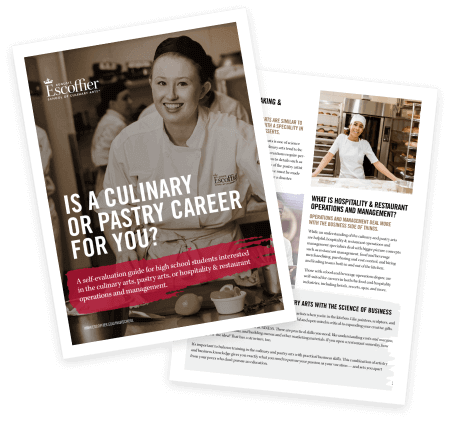
A hands-on externship in a bakery or restaurant can give you the mentorship and experience you may need to pursue your dream job in baking & pastry
Whether you’re looking to become a patisserie chef, learn professional baking techniques from the experts, or discover how to start a bakery, your externship can give you an opportunity to work toward your goals in a professional kitchen.
Explore Options to Help You Afford Pursuing a Diploma or Degree in the Baking and Pastry Arts
*59% of Boulder students who entered postsecondary education for the first time received some financial assistance in 2022-23 for those who applied and qualified, College Navigator, National Center for Education Statistics
*International students are not eligible for Title IV financial aid
Escoffier’s online programs are available through the Boulder, Colorado, campus. The average net price was $11,554 for grant or scholarship aid for students in the largest program for the time in academic year 2022-23.*
*College Navigator, National Center for Education Statistics
Program Cost: $33,435†
Program Length: 60
weeks
No Application Fee!
Apply NowProgram Cost: $22,151†
Program Length: 60
weeks
No Application Fee!
Apply Now†The total program cost listed above encompasses tuition, tool kit, uniform, and an optional non-refundable technology fee if you do not already have a computer. As textbooks are delivered electronically, the cost of books used in the program and available online to the students are included in the tuition cost. For more cost details, refer to our catalog.
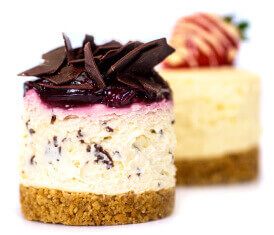
Academic weeks required to complete the online degree or diploma program.
Hours per week recommended for academics, depending on the student’s learning style.*
Approximate time required to complete an online application. Apply today!
International Study Opportunities in France
Now Escoffier students can study at the renowned École Ducasse culinary institute in France and graduates can transfer credits towards a bachelor’s degree.
Get DetailsA proven, flexible path to learning the baking & pastry arts: programs designed for busy schedules
Balancing a career, family duties, and personal commitments can be challenging. At Escoffier, we recognize that adult learners often have demanding and unpredictable schedules.
Keeping this in mind, if you are passionate about baking and pastry, we provide a flexible educational experience with a comprehensive, career-oriented curriculum designed to fit into your existing routine.
It won’t be easy—you might face challenges and dedicate many hours. However, with commitment and effort, Escoffier empowers you to attain a diploma or degree in baking and pastry, even with a hectic daily life.
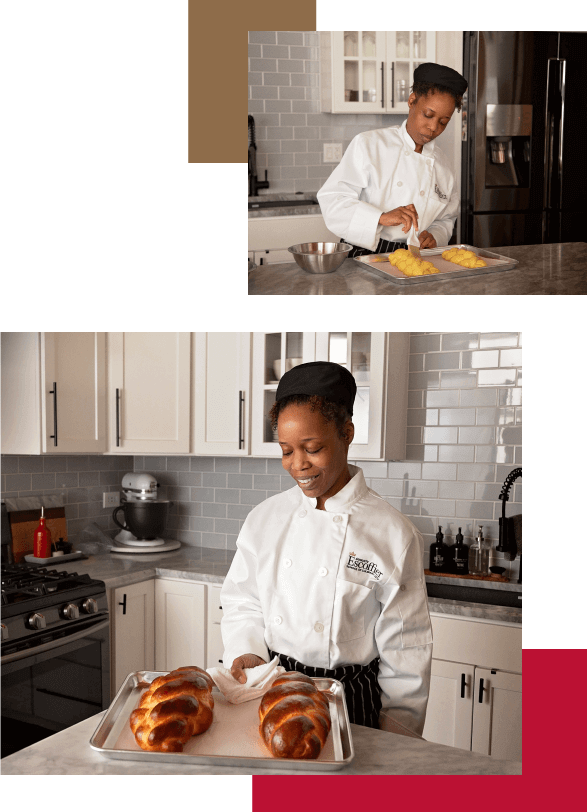
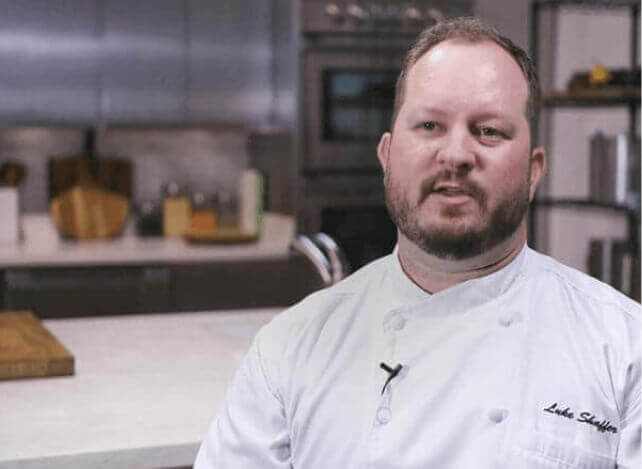
Escoffier’s Online Learning Model Explained
Auguste Escoffier School of Culinary Arts pioneered the online learning model for the baking & pastry arts. Here’s how it works:

LEARN

DISCUSS
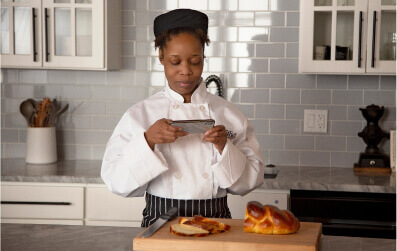
EXPERIENCE
Meet Your Online Baking and Pastry Chef Instructors
You have a dream…a dream of honing your baking craft and delivering pastries that are delicious and beautiful. Or maybe you wonder about starting a bakery from home. Perhaps you wonder what it it would take in terms of experience and years of work to become a pastry chef and reach the pinnacle of the industry.
How do you get from where you are now to your dream job in the professional baking arts?
You know that hard work and commitment lies ahead. That’s why you need Escoffier Chef Instructors in your corner. As your coaches and mentors, their job is to hold you to the highest and best version of yourself that you can be…to stretch your creativity, and help you move beyond whatever limitations you ever thought you might have.
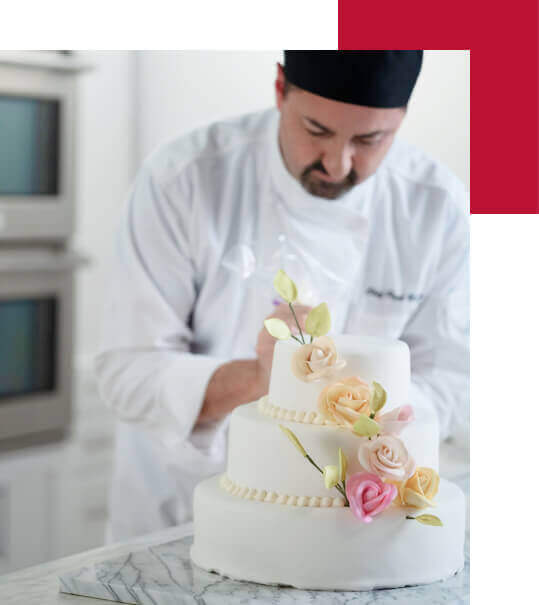
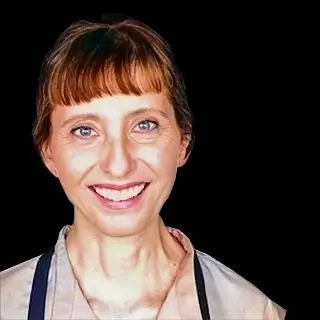
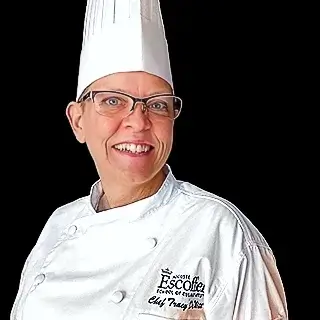
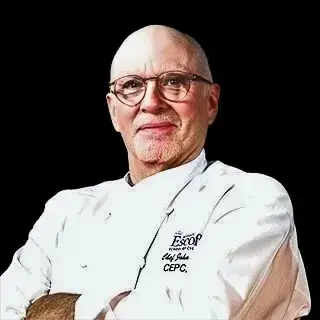
Here are a few samples of the baking, pastry, and practical business lessons you could encounter in our courses
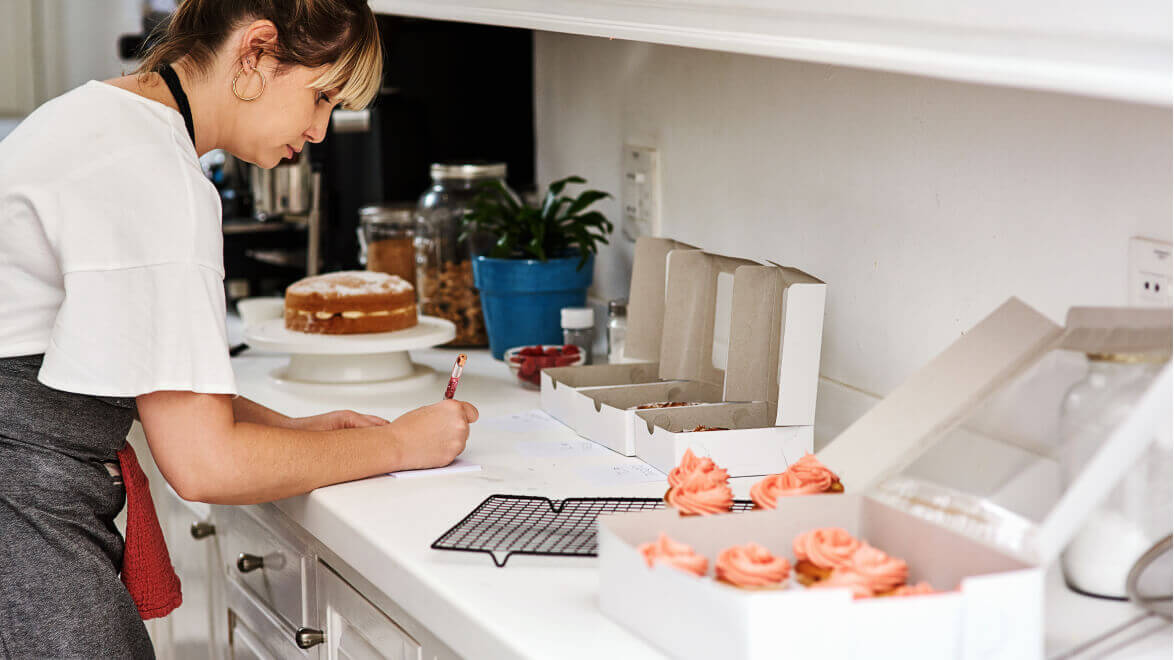
Get started on a home bakery business plan or other food service operation
- Explore topics such as business planning, government regulation, and business ethics for how to start a bakery, or assist your employer in expanding theirs.
- Begin a business plan for a foodservice operation that you can present to your peers, including your own home bakery business plan.
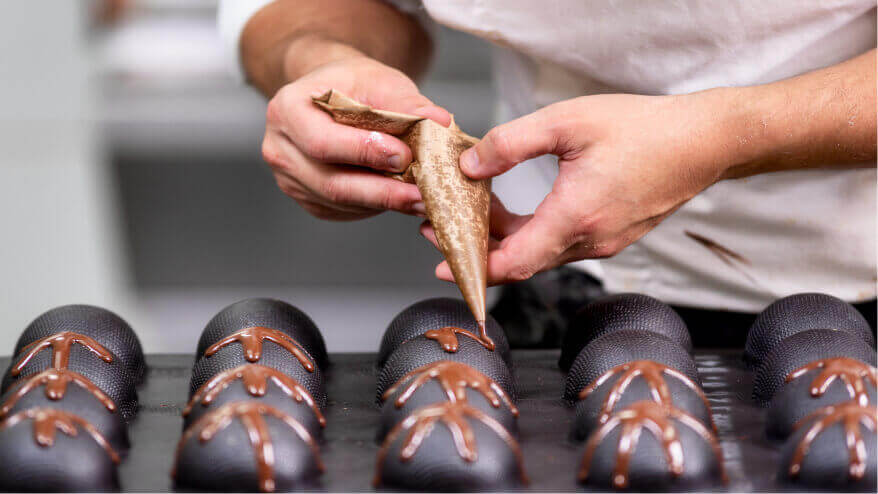
Study classic chocolate-making techniques to help you explore how to become a chocolatier
- Study the proper techniques in storing, melting, and tempering chocolate, as well as creating chocolate decorations.
- Discover sugar cookery and confections, explore a variety of fruit desserts and petit fours, and end the course with lessons on frozen desserts, including ice cream and gelato.
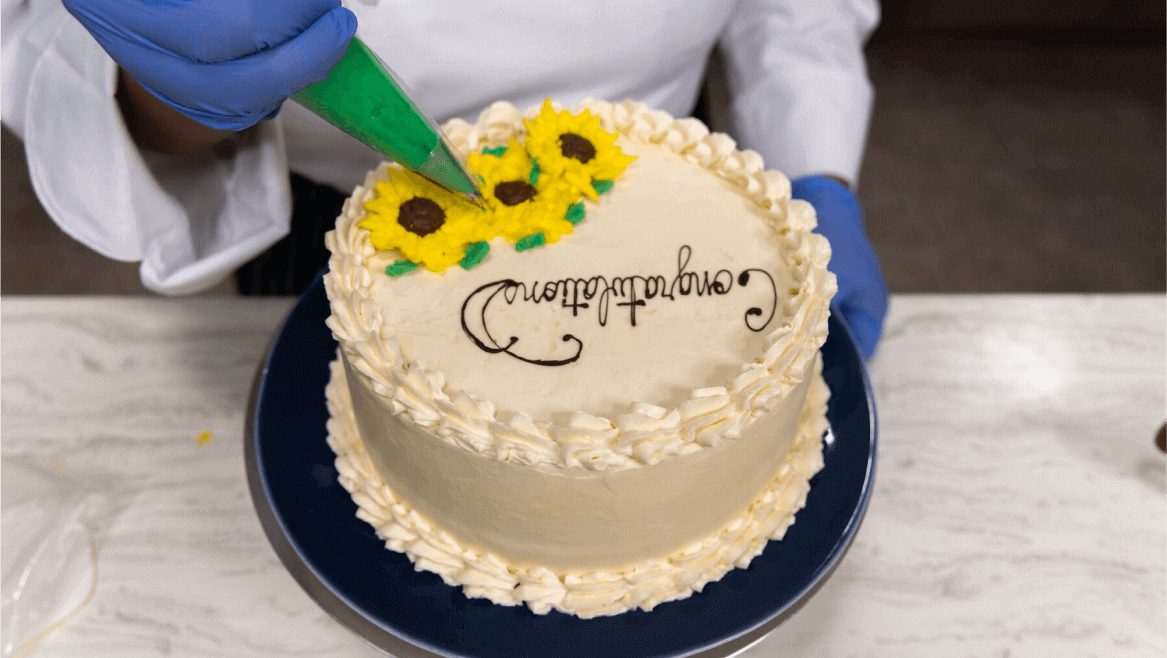
Practice cake decorating techniques to improve your artistry when baking
- Cake decorating classes can help students learn about various styles of cake decoration, progressing from basic icings and frostings to cake assembly.
- Courses range from basic cake decorating to intermediate decorating techniques and fine line piping.
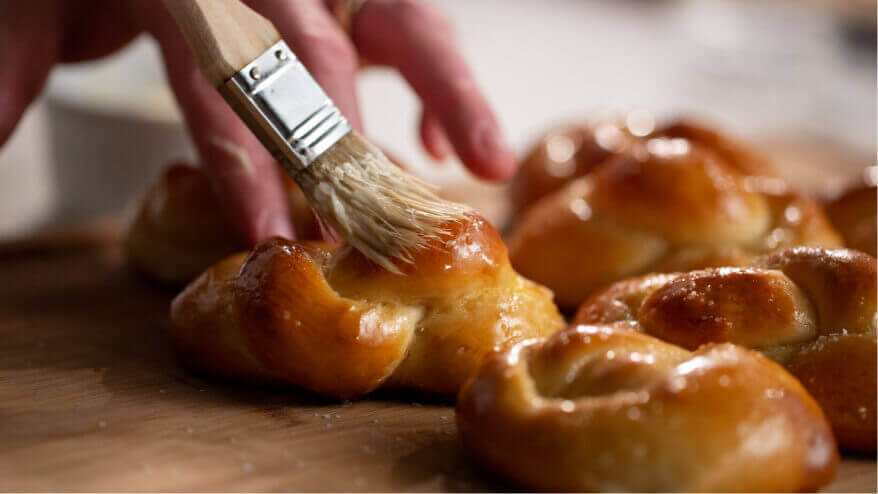
Explore the art and science of bread baking in bread baking classes
- Use starters and levains, calculate optimal temperature, and work with various doughs and pre-ferments to create multiple different varieties of bread.
- Use additional methods to create yeasted doughs, laminated doughs, sweet doughs, and croissants, and use dough shaping in more complex ways.
Accredited and Respected Worldwide
The reputation of the institution where you earn your degree or diploma is an important measure of value. Escoffier is recognized industry-wide as a leader in culinary education. The Boulder, Colorado campus develops and delivers Escoffier’s online programs. It is accredited by the Accrediting Council for Continuing Education & Training (ACCET) and is approved and regulated by the Colorado Department of Higher Education, Division of Private Occupational Schools.
*Based on comparable student population data for Austin and Boulder as currently reported in Integrated Postsecondary Education Data System (IPEDS).
*This information may not reflect every student’s experience. Results and outcomes may be based on several factors such as geographical region or previous experience.
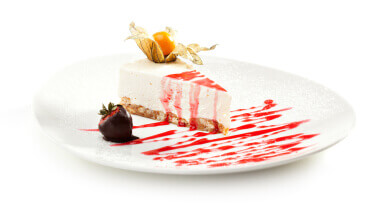
An online baking & pastry degree that can pave the way to a delicious career
So much of our culture revolves around food: celebrations, gatherings, comfort, and artistry—which only heightens the demand for professionals who can craft delectable pastries and exquisite baked goods.
The skills, techniques, and training you can acquire as you complete your baking & pastry degree can help prepare you to cater to the demand for trained bakers and pastry chefs.
Restaurants, cafés, bakeries, and private clients may be on the lookout for the next culinary sensation. Baking and pastry artists are the heart of dessert innovation, turning simple ingredients into mouthwatering masterpieces. A diploma or degree in baking & pastry from Escoffier may allow you to become a pivotal player on any culinary team, bringing sweetness and creativity to dining tables worldwide.
Employment for pastry & baking workers is projected to grow 5 percent from 2022 to 2032, 66% faster than the average for all occupations.*
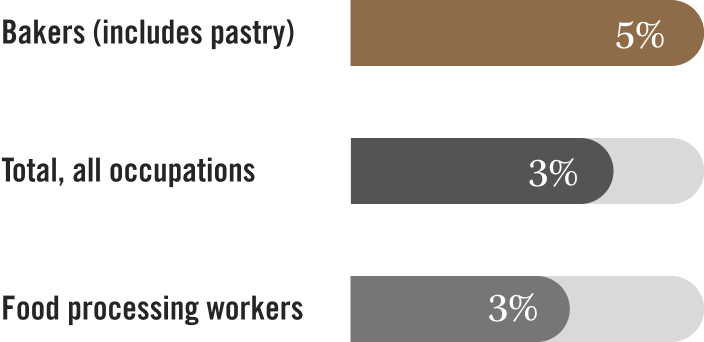
*Occupational Outlook Handbook, U.S. Bureau of Labor Statistics
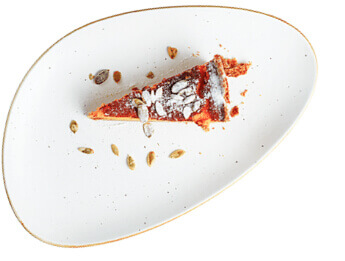
Unfilled Jobs
The commercial baking industry is facing a significant workforce shortage. By 2030, projections suggest that there could be a shortfall of 53,500 jobs, with a ripple effect throughout the supply chain.*
*American Bakers Association Warns of Looming Workforce Shortage, America Bakers Association
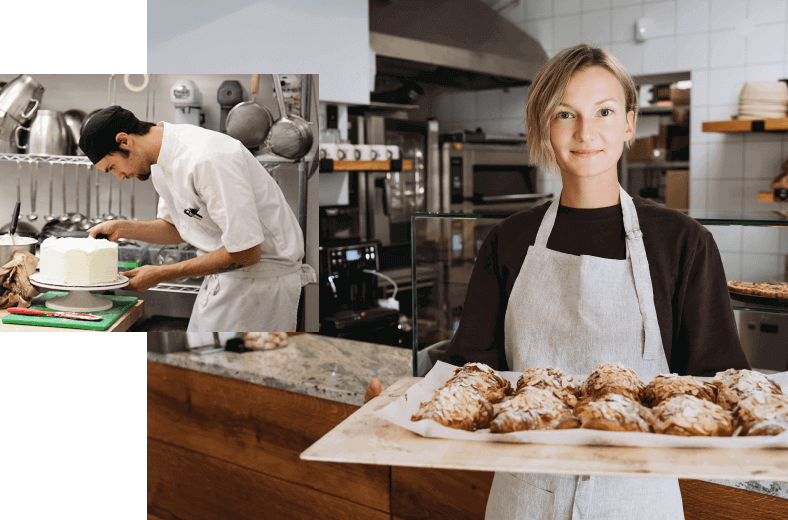
EXAMPLE JOB TITLES
- Baker
- Pastry Cook
- Assistant Pâtisserie Chef
- Pastry Assistant
- Bakery Manager
- Chocolatier
- Bakery Café Cook
- Dessert Food Truck Cook
- Boutique Baker
- Home Bakery Owner
- Cake Decorator
- Recipe Developer
EXAMPLE EMPLOYERS
- Bakeries
- Cafés & Coffee Shops
- Restaurants
- Supermarkets
- Catering Companies
- Food Magazines & Blogs
- Dessert Boutiques
- Food Trucks
- Chocolate Shops
- Resorts & Spas
- Retirement Communities
Some Esteemed Employers that Have Hired Escoffier Graduates
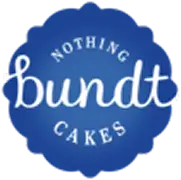


EXPLORE CAREERS AND EXTERNSHIPS IN OUR CAREER CENTER WITH THE HELP OF OUR CAREER SERVICES specialists
Get “insider knowledge” on how you can uncover career opportunities with our employer partners.
Career Planning
Resume and Portfolio Assistance
Interview Preparation
Escoffier’s Admissions Requirements
To enroll at Escoffier and get started in the baking & pastry degree or diploma program, you must show proof of a high school diploma or general equivalency diploma (GED). You do not need any specific work experience, nor do you have to take the ACT or SAT to be admitted to any program at Escoffier. For more information, see our catalog.
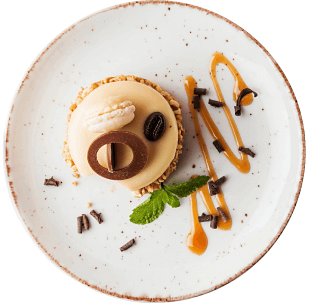
Frequently Asked Questions About Our Baking and Pastry Arts Programs
What is culinary school for baking?
A culinary school for baking is an educational institution that specializes in providing comprehensive training in the art and science of baking and pastry preparation. The school can teach culinary techniques, recipe development, food safety, and presentation skills, preparing students for careers as pastry cooks, bakers, cake decorators, and chocolatiers.
When students enroll in Escoffier’s Baking & Pastry programs, they gain access to classes that can cover a wide range of topics, including bread making, cake decorating, pastry techniques, and chocolate work. With an emphasis on hands-on training, students can have the opportunity to develop their baking skills under the guidance of experienced Chef Instructors.
What if I’m an international student living outside of the U.S.?
If you live outside of the U.S. and are interested in our online baking & pastry programs, we’re here to help! Visit our International Students page to learn about admissions, visa support, and everything you need to get started.
How much do bakers make on average with a degree or diploma?
The average salary for bakers can vary widely, depending on factors such as location and the type of establishment where they work. According to the U.S. Bureau of Labor Statistics, the median annual wage for bakers was $34,950 as of May 2023. Higher salaries may be available to bakers with more experience—including a degree or diploma—on their resume. It is important to note that earning a degree typically does not guarantee qualification for a person to become a baker. It is possible to become a pastry chef without a degree, but earning a degree or diploma may boost earning potential.
Can your programs help me start a bakery business?
They could! To start a bakery business successfully, you’ll need a combination of technical skills, business acumen, and knowledge of local regulations. Here’s how Escoffier programs can help you gain the knowledge and insight for such an endeavor:
- Baking & Pastry Foundations: Escoffier’s programs can help equip you with foundational baking and pastry skills, which are fundamental for creating high-quality baked goods. This knowledge and understanding can be crucial when you begin offering your products to customers.
- Menu Development: Our programs can help you refine your recipes and come up with unique and appealing menu offerings for your bakery.
- Food Safety and Sanitation: Understanding food safety and sanitation practices is vital when preparing and selling food products. Our Baking & Pastry programs can include training on these topics.
- Business Planning: Escoffier can help teach you to develop a business plan that outlines your bakery concept, target market, pricing, marketing strategy, and financial projections. The education also includes financial management principles, such as understanding budgeting, pricing strategies, and financial record-keeping to help ensure the profitability of your bakery.
- Legal and Regulatory Compliance: Our Baking & Pastry programs may cover local, state, and federal regulations related to operating a food business. This can include obtaining necessary permits, licenses, and adhering to health and safety standards.
Our programs can provide you with a strong foundation in baking and pastry arts, as well as foodservice management skills—which can be essential elements for building a successful bakery business.
For more information on starting a baking business, check out our blog article: How to Start a Bakery Business from Home.
Can your programs teach me how to start an online bakery?
Yes! As mentioned above, starting an online bakery requires baking & pastry knowledge, as well as knowledge of menu development, food safety and sanitation, business planning, legal and regulatory compliance, and home-based business considerations. These are all topics that our Baking & Pastry degree and diploma programs can prepare students to perform in a professional setting. For more information on how you can start an online bakery, check out our blog article: Building an Online Pastry Shop.
Does Escoffier offer baking & pastry certificate programs?
Escoffier does not offer certificate programs in baking & pastry. However, the school offers degree and diploma programs that provide students with a comprehensive education in the art and science of baking & pastry. The programs can also provide them with a well-rounded baking foundation that encompasses a range of techniques. With a curriculum designed by industry specialists, students can hone their baking skills and potentially gain an edge in the professional baking & pastry industry.
Is there a difference between a pastry chef and a baker?
A pastry chef and a baker are both skilled professionals in the world of baking, but they specialize in different aspects of the craft. A baker produces a wide variety of items, including bread, rolls, cakes, and other baked goods that are staples of everyday consumption. The role of baker is more likely to be an entry-level position.
On the other hand, a pastry chef is typically responsible for specializing in desserts and may also make non-baked goods such as custards, sauces, and chocolate. They often work in upscale restaurants, hotels, or pastry shops, and their creations involve a high level of artistry and precision, including techniques like tempering chocolate, crafting intricate sugar decorations, and creating complex flavors. This role is typically more advanced than a baker role and comes with more experience.
For a more in-depth description of these roles, you can refer to our article: Pastry Chef vs Baker: What’s the Difference.
What can you do with a baking & pastry degree?
A baking & pastry degree can open up a wide range of exciting career opportunities in the culinary industry. Here are some potential career paths and roles you can pursue with this degree:
- Pastry Chef: As a pastry chef, you can work in upscale restaurants, hotels, bakeries, or pastry shops. While a pastry chef makes baked goods, they typically also specialize in non-baked desserts such as custards, sauces, and chocolates.
- Baker: Bakers primarily focus on producing bread, rolls, cakes, cookies, and other baked goods. You could work in bakeries, pastry shops, or even operate your own bakery, specializing in artisanal bread, cupcakes, or other baked specialties.
- Cake Decorator: If you have a passion for cake design and decoration, you can become a cake decorator. This role involves creating custom cakes for special occasions like weddings, birthdays, and other celebrations, often incorporating intricate designs and food sculptures.
- Chocolatier: Specializing in chocolate-making, chocolatiers create various chocolate confections and truffles. You can work in artisan chocolate shops, start your own chocolate business, or even collaborate with other pastry chefs to incorporate chocolate into their creations.
- Dessert Menu Developer: Some restaurants and dessert-focused establishments hire pastry chefs to develop and manage their dessert menus. This role involves creating new dessert recipes, adapting classics, and ensuring consistency in flavor and presentation.
- Food Stylist: Food styling is an exciting niche within the culinary industry where you can use your creativity to make food look visually appealing for photography, advertisements, or film. Pastry chefs with a talent for aesthetics are often in demand for this role.
- Food Entrepreneur: With the skills gained from a baking and pastry degree, you can start your own business. This could include opening a bakery or pastry shop, or even launching an online bakery or dessert subscription service.
A baking and pastry degree can equip you with the practical skills and theoretical knowledge to help you excel in your culinary career, and it can provide a solid foundation for pursuing a career that you’re passionate about in the baking & pastry industry.
Is this a pastry chef school?
We are a culinary arts school that offers programs in a wide variety of culinary disciplines, including baking & pastry, food entrepreneurship, plant-based culinary arts, holistic nutrition and wellness, and hospitality and restaurant operations management. Our baking & pastry programs can provide students with the foundations to help them pursue a career as a professional baker or other baking & pastry professionals post-graduation; this is done through providing them with a well-rounded education in baking techniques, pastry preparation, dessert plating and presentation, chocolate work, and hands-on industry externship work.
How is this like a baking institute or pastry academy?
Auguste Escoffier School of Culinary Arts shares similarities with baking institutes and pastry academies in that it offers specialized training and education in the field of baking and pastry arts. Here are some ways in which it is similar to these types of institutions:
- Specialization: Like baking institutes and pastry academies, Escoffier specializes in education and training specifically focused on baking, pastry, and dessert preparation.
- Comprehensive Curriculum: Escoffier offers a comprehensive curriculum that can cover a wide range of topics related to baking and pastry arts. This curriculum includes fundamental techniques, advanced skills, and specialized areas of study within the pastry field.
- Hands-On Training: Students at Escoffier perform hands-on baking tasks in their own kitchens, allowing them the opportunity to practice and improve their baking and pastry skills under the guidance of experienced instructors.
- Experienced Faculty: Escoffier employs instructors who are skilled pastry chefs with real-world industry experience, similar to the faculty found in baking institutes and pastry academies.
- Certification: Like pastry academies and baking institutes, Escoffier provides students with a degree or diploma upon successful completion of their programs, providing a recognized credential in the field of baking and pastry arts. Note that Escoffier does not offer “certificates.”
- Industry Connections: The school often has connections with bakeries, pastry shops, and the broader culinary industry, helping to facilitate externships and job searches for graduates.
While Escoffier’s baking & pastry programs share many similarities with baking institutes and pastry academies, our curriculum offers a wider range of culinary disciplines and programs as well.
How is a typical online baking class conducted?
The online programs at Escoffier allow students to learn similar skills as campus students, but they complete the program in their own kitchen. (Read our article: Is Online Baking School Right for You?)
A typical week for a student begins by reviewing interactive lesson material and any potential production required for weekly lab assignments. From there, students can attend an online live session with their classmates and Chef Instructors or review the session recordings. Students then have a weekly baking assignment that is recorded through photos and a written summary. A production sheet is given to students to show the steps they take in the baking process and allows them to record their process for Chef Instructors. Once the assignment is completed, a Chef Instructor will go through the production sheet and photos and talk through feedback with the student.
What makes Escoffier one of the top baking and pastry programs?
Escoffier is frequently acknowledged as a school with leading baking and pastry programs* for several reasons:
*2024 Best Baking & Pastry Arts (#7 nationally), CollegeFactual.com
- Comprehensive Programs: Escoffier offers comprehensive programs in baking and pastry arts that cover a wide range of topics, from foundational techniques to advanced skills and specialized areas such as chocolate work and sugar art.
- Experienced Faculty: The school employs experienced pastry chefs and instructors who have real-world industry experience. This allows students to learn from professionals who have worked in the field and can provide valuable insights.
- Hands-On Training: Escoffier emphasizes hands-on training, giving students the opportunity to practice and refine their skills.
- Industry Connections: The school often has strong connections with the culinary industry, including partnerships with local bakeries, pastry shops, and restaurants. This can lead to externship and job search opportunities for graduates.
- Strong Culinary Community: Students at Escoffier have the opportunity to be part of a culinary community, connecting with fellow students, instructors, and industry professionals, which can be valuable for networking and future career opportunities.
- Alumni Success: The success stories of Escoffier graduates who have gone on to become accomplished pastry chefs and bakers speak to the quality of education and training provided by the school.
What degree do I need to be a pastry chef?
It’s important to understand that earning a degree typically does not, on its own, qualify a person to become a pastry chef. It’s possible to become a pastry chef without a degree, but reaching the pinnacle of any profession typically requires a combination of education, experience, talent, and dedication. Your advancement in the pastry arts will depend on many circumstances in and out of your control.
Prospective students must make their own decisions as to whether or not they believe a degree can help them in their careers and if it is worth the investment, based on their own needs, goals, and life circumstances. Auguste Escoffier of Culinary Arts cannot guarantee employment, or that a degree from our institution will lead to any specific employment outcomes.
Is Escoffier a baking and pastry school?
Escoffier’s online baking and pastry programs are offered through the Boulder campus, which is classified as a “culinary school.” In general, baking and pastry schools only offer baking and pastry programs, whereas Escoffier offers programs in the baking and pastry arts, culinary arts, and more. If you compare Escoffier’s baking and pastry programs to those offered by baking and pastry schools, you are likely to find many similarities.
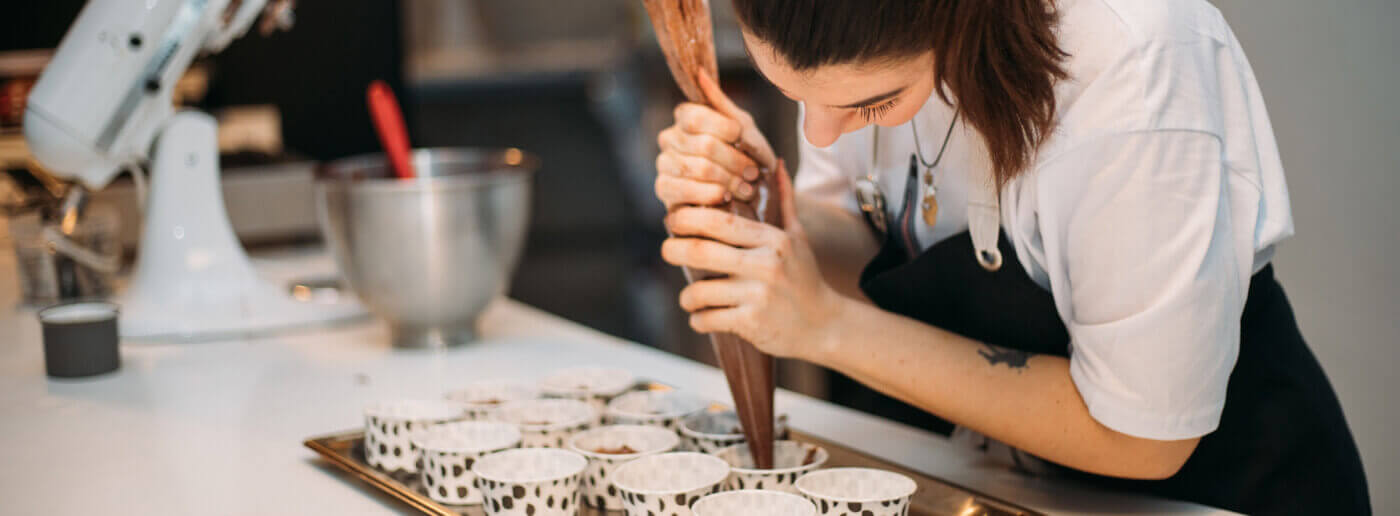
Step into a world of pastry careers with our baking and pastry programs. Start your new career journey today!

